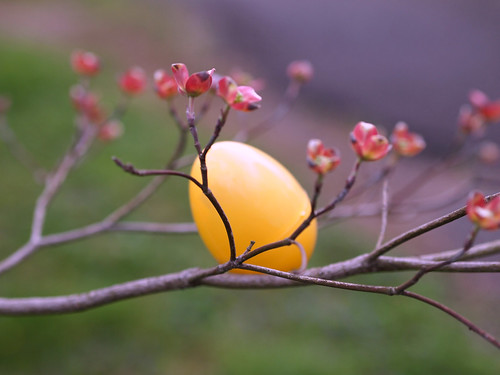In A.D. 325, the Council of Nicaea set the date of Easter as the Sunday following the paschal full moon, which is the full moon that falls on or after the vernal (spring) equinox. In practice, that means that Easter is always the first Sunday after the first full moon that falls on or after March 21. Thus, Easter can occur as early as 22 March and as late as 25 April, depending on when the paschal full moon falls.— Catholicism About (via ThoughtCo.com).
We know that Easter must always occur on a Sunday, because Sunday was the day of Christ's Resurrection. But why the paschal full moon? Because that was the date of Passover in the Jewish calendar, and the Last Supper (Holy Thursday) occurred on the Passover. Therefore, Easter was the Sunday after Passover.
The Church does not use the exact date of the paschal full moon but an approximation, because the paschal full moon can fall on different days in different time zones, which would mean that the date of Easter would be different depending on which time zone you live in.
For calculation purposes, the full moon is always assumed to be on the 14th day of the lunar month (the lunar month begins with the new moon). Likewise, the Church sets the date of the vernal equinox on March 21, even though it can occur on March 20 [or 19]. Both approximations allow the Church to set a universal date for Easter.
Still, Easter isn't celebrated universally on that date—at least not on the calendar we all use in everyday life. While Western Christians use the Gregorian calendar (the calendar that's used throughout the West today, in both the secular and religious worlds) to calculate the date of Easter, the Eastern Orthodox continue to use the older, astronomically inaccurate Julian calendar.
Currently, March 21 on the Julian calendar falls on April 3 in the Gregorian calendar. Therefore, for the Orthodox, the Sunday following the 14th day of the paschal full moon has to fall after April 3, hence the discrepancy in the date of Easter. Note that the Orthodox use the exact same formula for determining the date of Easter; the entire difference comes from their use of the Julian calendar rather than the Gregorian one.
Spring arrived nearly four weeks ago, on 20 March. The first full moon of the spring season, the Paschal Moon, occurred just this past Tuesday, 11 April.
Thus, in the year 2017, Christians will be celebrating Easter on 16 April —precisely the first Sunday after the Paschal Moon. ...Tomorrow.
-----more-----
- Origin and Etymology of pasch (al):
“Middle English pasche Passover, Easter, from Anglo-French, from Late Latin pascha, from Late Greek, from Greek, Passover, from Hebrew pesaḥ. First known use: 12th century.”
—Merriam-Webster - Pic(k) of the Week: one in a weekly series of personal photos, usually posted on Saturdays, and often, but not always (as is the case today), with a good fermentable as the subject. Camera: Olympus Pen E-PL1.
- Commercial reproduction requires explicit permission, as per Creative Commons.
- For more from YFGF:
- Follow on Twitter: @Cizauskas.
- Like on Facebook: YoursForGoodFermentables.
- Follow on Flickr: Cizauskas.
- Follow on Instagram: @tcizauskas.









No comments:
Post a Comment
Comment here ...